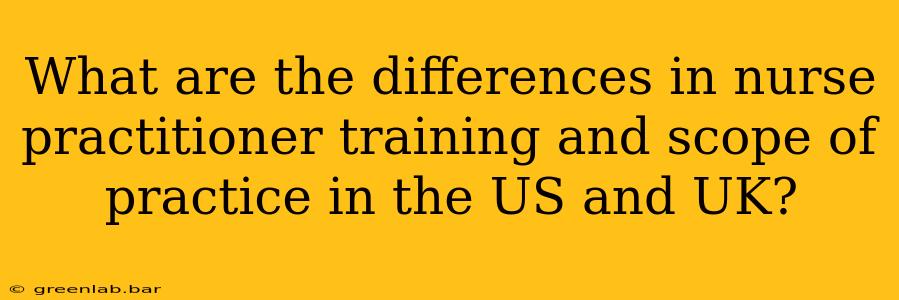The roles and responsibilities of Nurse Practitioners (NPs) differ significantly between the United States and the United Kingdom. Understanding these differences is crucial for anyone considering a career as an NP or seeking healthcare in either country. This post will delve into the key distinctions in training pathways and the scope of practice for NPs in both the US and the UK.
Educational Pathways: A Tale of Two Systems
The educational requirements for becoming a Nurse Practitioner are strikingly different across the Atlantic.
United States:
- Bachelor of Science in Nursing (BSN): A BSN is the standard entry-level requirement. While some programs may accept Associate Degree in Nursing (ADN) graduates, a BSN is increasingly preferred and often mandated by employers.
- Master's of Science in Nursing (MSN): This is the traditional path to becoming an NP in the US. MSN programs typically include coursework in advanced pharmacology, physical assessment, pathophysiology, and specific areas of specialization (e.g., family practice, pediatrics, adult-gerontology). Clinical practice hours are a significant component of the curriculum.
- Doctor of Nursing Practice (DNP): The DNP is gaining popularity as the entry-level degree for NPs in many US institutions and is often required for certain advanced roles. It emphasizes clinical practice and leadership, with a strong focus on evidence-based practice and quality improvement.
United Kingdom:
- Registered Nurse (RN): Aspiring NPs in the UK must first qualify as a Registered Nurse. This typically involves a three-year bachelor's degree in nursing or a diploma program.
- Prescribing Qualification: Nurses in the UK must obtain a prescribing qualification to legally prescribe medications. This is separate from their initial nursing training.
- Master's Level Training: Following RN qualification and the prescribing qualification, nurses can then pursue a master's level program specifically in nurse prescribing or advanced nursing practice to become a Nurse Practitioner. These programs focus on advanced clinical skills and decision-making within a specific area of practice.
Scope of Practice: Autonomy vs. Collaboration
The scope of practice for NPs is a contentious topic in both countries, with significant variations based on state/region and individual circumstances.
United States:
- Varying State Regulations: The level of autonomy an NP has varies considerably across different states. Some states allow NPs to practice independently with full prescriptive authority, while others require collaboration or supervision by a physician. This creates a complex landscape with significant legal and regulatory implications.
- Full Practice Authority: The movement towards “full practice authority” advocates for allowing NPs to practice to the full extent of their education and training, without physician oversight.
- Specialization: US NPs often specialize in specific areas like family medicine, pediatrics, or oncology.
United Kingdom:
- Strong Emphasis on Collaboration: The UK model typically emphasizes collaborative practice between NPs and other healthcare professionals, including physicians, but the level of supervision is less restrictive than in many US states. NPs work as part of a multidisciplinary team.
- Defined Roles and Responsibilities: The roles and responsibilities of NPs are typically more clearly defined within established protocols and pathways, providing greater clarity regarding their legal parameters.
- Less Specialization: While some UK NPs may focus on a specific area of practice, the specialization is often less rigid than in the US system.
Key Differences Summarized:
| Feature | United States | United Kingdom |
|---|---|---|
| Entry-Level Education | BSN (increasingly MSN or DNP) | Registered Nurse (RN) |
| Advanced Education | MSN or DNP | Master's in Advanced Nursing Practice/Prescribing |
| Prescribing Authority | Varies greatly by state; full practice authority a growing trend | Requires separate prescribing qualification |
| Scope of Practice | Varies widely by state; ranges from collaborative to independent | Generally collaborative within established protocols |
| Specialization | High degree of specialization | Less rigid specialization |
This overview highlights the significant differences in NP training and scope of practice between the US and the UK. The evolving nature of healthcare in both countries means these nuances are subject to ongoing change and debate. Further research based on specific locations and specializations is recommended for a more in-depth understanding.

